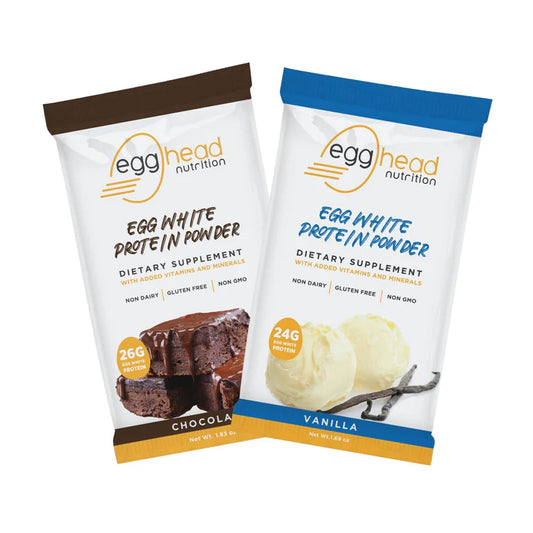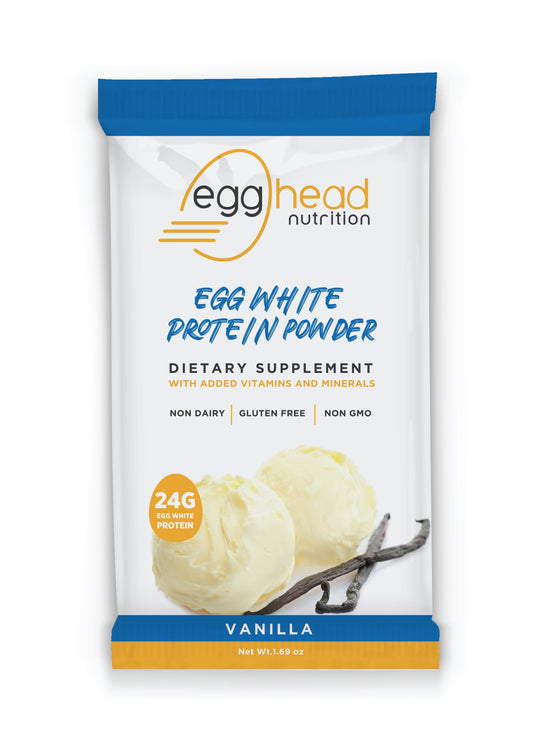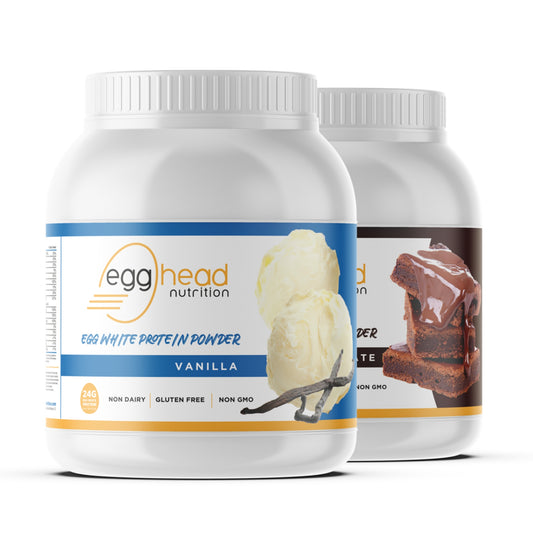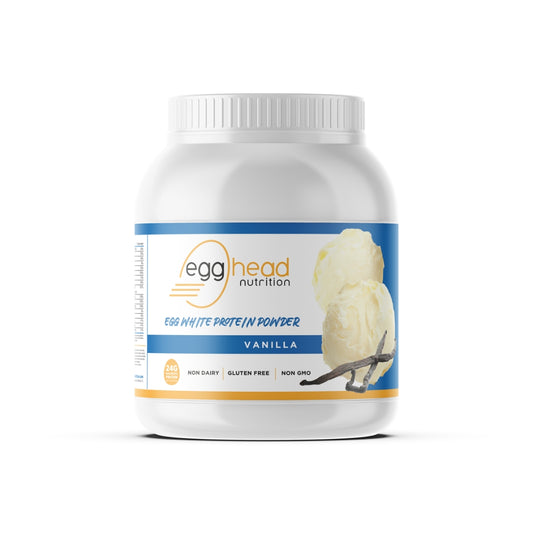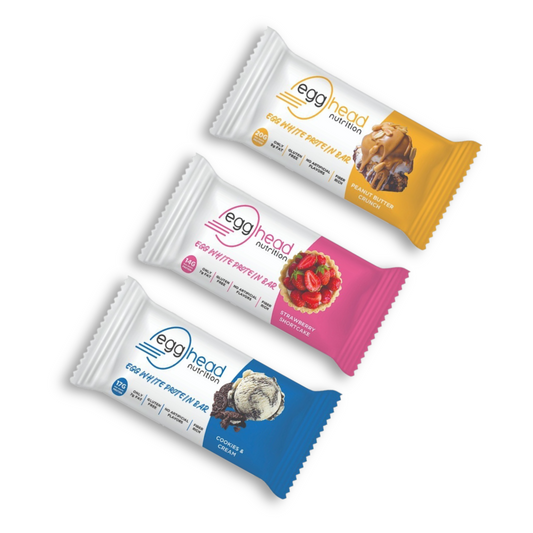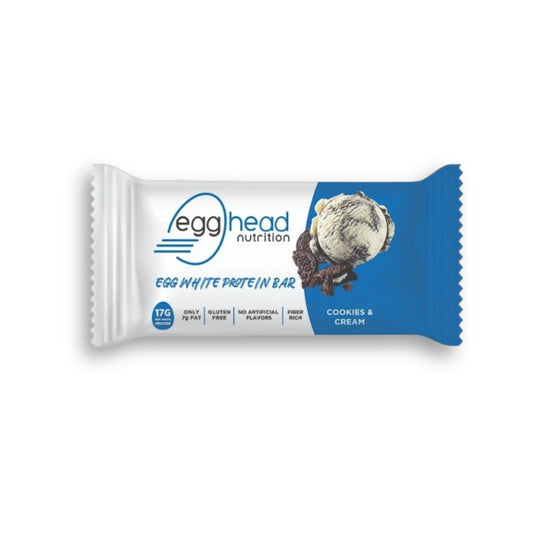Introduction to Protein Powders
Protein powders have become a staple in the fitness and health industry, offering a convenient way to meet dietary protein needs. In this article, we're going to compare two popular types: egg protein powder and whey protein.
Nutritional Showdown
Protein Content
Whey protein powder, a form of milk protein, is celebrated for its high protein content, making it a favorite among athletes and fitness enthusiasts. It's particularly lauded for its ability to facilitate quick muscle recovery post-exercise. On the other side, egg white protein powder, though slightly lower in protein content, offers a complete amino acid profile including branched chain amino acids (BCAAs). This means it contains all nine essential amino acids necessary for the human body, which are crucial for various bodily functions including muscle repair and growth.
For a high-quality egg protein option, check out Eggheads' selection of egg protein powders, providing all the essential amino acids in a convenient form.

Vitamins and Minerals
When it comes to vitamins and minerals, egg protein powder has a slight edge. It provides essential vitamins like B12, critical for maintaining nerve health and creating red blood cells. Whey protein, a key protein supplement, however, is not far behind with its rich calcium content, supporting bone health and playing a vital role in muscle contractions and blood clotting.
Fat and Calorie Count
For those watching their calorie intake, whey protein, especially the whey protein concentrate variant, often emerges as the preferred option. Generally, it has a lower fat and calorie count compared to egg protein powder. This feature makes whey protein a popular choice among individuals aiming for weight loss or muscle definition.
Digestibility and Allergen Considerations
Lactose Intolerance and Whey
Whey protein, derived from milk, can be a source of concern for individuals with lactose intolerance. It contains lactose, which can lead to digestive issues such as bloating and gas in sensitive individuals. In such cases, lactose-free whey isolates or plant-based alternatives might be better options.
Egg Allergies and Alternatives
Egg protein, while an excellent protein source, is not suitable for individuals with egg allergies. For those allergic to eggs, exploring other protein powders like pea or hemp protein can be a practical alternative.
Gut Health and Protein Absorption
The impact of protein powders on gut health and absorption rates is an important consideration. Whey protein is known for its rapid absorption, making it an ideal post-workout supplement. Egg protein, with its slower absorption rate, is better suited for providing a steady supply of amino acids over a longer period.
Fitness and Muscle Building
Protein Synthesis and Muscle Repair
Both egg and whey proteins are excellent for muscle synthesis and repair. Whey protein, with its high leucine content, is particularly effective in initiating protein synthesis after a workout. Egg protein, with its sustained release of amino acids, ensures continuous muscle nourishment, which is essential for muscle repair and growth over time.
Whey for Quick Absorption
The quick absorption of whey protein makes it a top choice for post-workout nutrition. It's rapidly digested and assimilated, which helps in speeding up muscle recovery and growth immediately after exercise.
Egg Protein for Sustained Release
Egg protein offers a slower, more sustained release of amino acids, making it a great option for continuous muscle nourishment throughout the day. This can be particularly beneficial for individuals looking to maintain a constant supply of protein to the muscles, especially when meals are spaced far apart.
Discover Eggheads' range of fitness-focused protein powders designed for muscle building and recovery.

Flavor and Functionality
Taste and Texture Differences
Taste and texture are significant factors in choosing a protein powder. Whey protein typically has a creamy texture and comes in various flavors. Egg protein powder, while more neutral in taste, might require some getting used to in terms of texture.
Mixability with Other Ingredients
Whey protein tends to mix well with liquids, making it easy to prepare smooth, lump-free shakes. Egg protein powder might need more vigorous shaking or blending to achieve the same smoothness.
Versatility in Recipes
Both egg and whey proteins can be used in a variety of recipes, from shakes and smoothies to baked goods. However, the distinct flavors of each can significantly influence the taste and texture of these recipes.
Choosing Based on Dietary Preferences
Vegetarian and Vegan Options
Whey protein is derived from milk, making it suitable for vegetarians but not for vegans. Egg protein powder, also not vegan-friendly, is another good option for vegetarians. For those adhering to a vegan diet, it's important to explore plant-based protein powders like pea, rice, or hemp protein, which can provide comparable nutritional benefits.
Ethical and Environmental Considerations
The production and sourcing of both egg and whey protein can have various environmental and ethical implications. For instance, the dairy industry's environmental impact and the treatment of animals can be a concern for some consumers. Similarly, the egg industry's practices might also influence the decision-making process of ethically-conscious individuals. It's important to consider these aspects and possibly look for sustainably sourced or certified humane options.
Personal Health Goals and Restrictions
Ultimately, the choice between egg protein powder and whey protein should be guided by individual dietary needs, health goals, and personal preferences. Whether you are lactose intolerant, have specific allergies, or have ethical concerns, your choice should align with your overall health objectives and lifestyle.
Conclusion
Choosing between egg protein powder and whey protein involves considering a variety of factors, including nutritional content, digestibility, personal fitness goals, taste preferences, and dietary restrictions. Each type of protein powder has its unique benefits and potential drawbacks. Understanding these can help you make an informed decision that best suits your individual health and fitness needs.
FAQs
Is whey protein or egg protein better for muscle building? Both whey and egg proteins are effective for muscle building. Whey protein is often preferred for its quick absorption post-exercise, while egg protein's sustained release of amino acids can be beneficial throughout the day.
Can people with lactose intolerance use whey protein? Individuals with lactose intolerance might find whey protein challenging to digest due to its lactose content. Lactose-free whey isolates or plant-based protein alternatives would be more suitable.
Are there vegan alternatives to these proteins? Yes, for those following a vegan diet, plant-based protein powders like pea, rice, or hemp protein offer great alternatives.
Which protein is better for weight loss? Both egg and whey protein can be effective in a weight loss diet. However, whey protein is typically preferred due to its lower calorie and fat content, which can be more conducive to weight management goals.
Can I use these proteins in cooking and baking? Absolutely, both egg and whey proteins are versatile and can be incorporated into various recipes. Whey protein is great for smoothies and shakes due to its excellent mixability and range of flavors. Egg protein, with its neutral taste, can be a useful addition to baked goods, pancakes, and other recipes where a more subtle flavor is desired.
Choosing between egg protein powder and whey protein involves considering factors like nutritional content, digestibility, fitness goals, and dietary restrictions. Understanding the unique benefits of each, including their role in muscle protein synthesis, can help in making an informed decision. Eggheads offers a variety of protein powders that cater to different needs, making it easier to find the right fit for your health and fitness journey.
For a diverse range of high-quality protein powders, and other protein supplements, Egghead Nutrition provides options that cater to different dietary needs and personal preferences.


